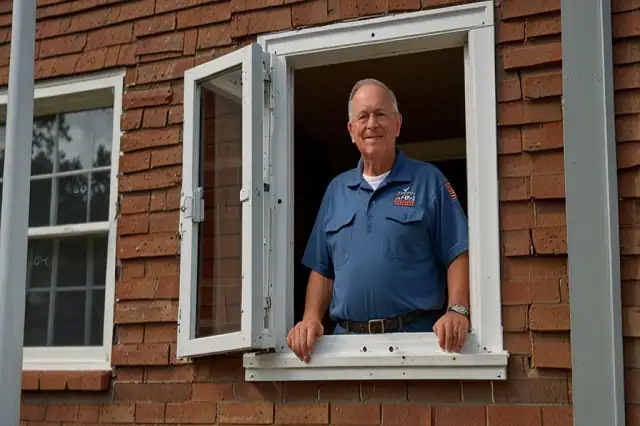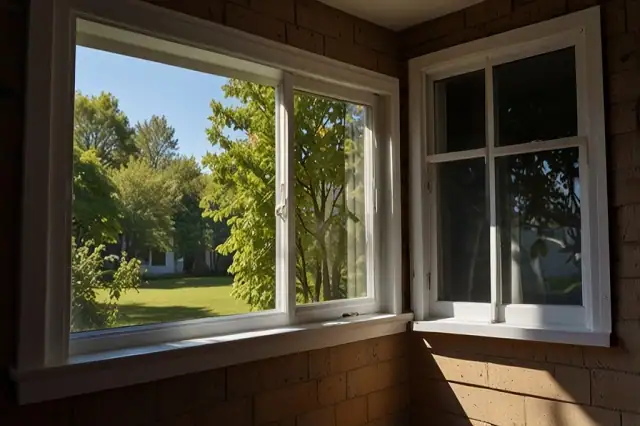For disabled veterans, maintaining a comfortable and affordable home can be challenging. Rising energy costs, combined with the need for home modifications, often put a financial strain on those who have served their country. One solution that offers both comfort and savings is upgrading to energy-efficient windows.
However, these home improvements can be expensive. Thankfully, various grants are available to help disabled veterans replace their windows with energy-efficient ones, offering financial relief and long-term savings.
In this article, we will explore the importance of energy-efficient windows, the various grants available for disabled veterans, and how to apply for this financial support. Our goal is to provide veterans with the information they need to improve their homes and reduce their energy bills.
Why Energy Efficiency Matters for Disabled Veterans
Energy efficiency is crucial for every household, but it is especially important for disabled veterans. Many veterans with disabilities may spend more time at home, making the comfort and energy efficiency of their homes critical. Energy-efficient windows help in maintaining a comfortable indoor temperature, reducing the need for heating in the winter and cooling in the summer.
For veterans with mobility or health issues, controlling the indoor climate is not just a matter of comfort—it is a matter of safety. Drafty windows can lead to cold spots and temperature fluctuations, which may aggravate certain health conditions. Additionally, high energy costs can strain a fixed income, which many disabled veterans rely on. By replacing old, inefficient windows with new energy-efficient models, veterans can experience reduced energy bills and a more comfortable living environment.
Beyond personal benefits, energy-efficient windows also contribute to environmental sustainability. They reduce the overall energy consumption of the home, which in turn lowers the carbon footprint. By making this upgrade, veterans are also contributing to environmental conservation efforts.
Types of Grants Available for Disabled Veterans
Fortunately, there are several grant programs specifically designed to help veterans, including those with disabilities, make energy-efficient upgrades to their homes. These grants come from federal, state, and local sources, as well as private organizations. The key is understanding what options are available and determining eligibility.
Read- Energy-Efficient Window Replacement For Veterans- Cost and Grants
VA Specially Adapted Housing (SAH) Grant
The VA Specially Adapted Housing (SAH) Grant is one of the most well-known programs available to disabled veterans. This grant helps veterans with service-related disabilities make necessary modifications to their homes, including the replacement of windows. While the primary focus of the grant is on accessibility improvements, energy-efficient upgrades, such as window replacement, are often included if they improve the overall functionality and livability of the home.
To qualify for an SAH grant, a veteran must have a service-connected disability that severely affects their mobility, such as the loss of one or more limbs or severe burns. This grant provides up to $109,986 (as of 2023) for home modifications, which can include energy-efficient window replacements.
Read- Senior Discounts For Window Replacement- Guide For Homeowners
VA Special Housing Adaptation (SHA) Grant
Another option through the VA is the Special Housing Adaptation (SHA) Grant. This grant is designed for veterans who are blind in both eyes or have lost the use of both hands. Like the SAH grant, the SHA grant can be used for various home modifications, including energy-efficient upgrades.
In 2023, the SHA grant provides up to $22,036 for eligible veterans. This funding can help cover the cost of installing energy-efficient windows, which can reduce utility bills and increase home comfort.
Weatherization Assistance Program (WAP)
The Weatherization Assistance Program (WAP) is a federally funded program that helps low-income households, including veterans, reduce energy costs by improving the energy efficiency of their homes. This program is administered at the state level and offers services such as window replacement, insulation upgrades, and HVAC improvements.
Veterans who meet income requirements may qualify for this program and receive financial assistance to replace old windows with more energy-efficient models. WAP not only helps lower energy bills but also improves the overall comfort and safety of the home.
Low-Income Home Energy Assistance Program (LIHEAP)
While primarily known for helping low-income households pay their energy bills, the Low-Income Home Energy Assistance Program (LIHEAP) also offers grants assistance for energy-efficient home improvements, including window replacement. Veterans who are eligible for LIHEAP can apply for additional support to upgrade their windows, which will lead to lower energy bills in the long term.
LIHEAP is managed at the state level, and each state has its own eligibility criteria. Disabled veterans who meet the income requirements can apply for financial assistance through this program.
State and Local Programs
In addition to federal grants, many states and local governments offer their own energy efficiency programs. These programs often provide rebates, incentives, or grants for energy-efficient home upgrades, including window replacement. Veterans should check with their state’s Department of Veterans Affairs or local energy efficiency programs to see what options are available.
Many utility companies also offer rebates for energy-efficient window installations. These rebates can help cover the cost of new windows, making them more affordable for veterans.
Private and Nonprofit Organizations
Several private organizations and nonprofits offer grants and financial assistance to veterans. Organizations like Habitat for Humanity and Rebuilding Together focus on helping veterans with home repairs and upgrades. These organizations may offer grants or low-cost services to replace windows with energy-efficient options.
Veterans should also consider reaching out to local veterans’ organizations and charities, as they often have access to additional resources or can point veterans in the right direction.
Eligibility Criteria for Window Replacement Grants
Eligibility for free energy-efficient window replacement grants can vary depending on the specific program. However, there are some common criteria that veterans will need to meet to qualify for most grants.
Read- Energy Efficient Window Replacement Grants For Veterans in Florida
Disability Status
Most grants are aimed at veterans with service-related disabilities. For programs like the VA SAH or SHA grants, veterans must have a disability rating from the VA. This rating will determine eligibility for specific grants and the amount of funding available.
Income Requirements
Some programs, like WAP and LIHEAP, are designed for low-income households. Veterans will need to provide proof of income to qualify for these programs. Each program has its own income limits, which may vary based on the veteran’s location and household size.
Home Ownership
Most grants are intended for veterans who own their homes. Renters may not qualify for certain programs unless they have permission from their landlord to make modifications. Some state and local programs may offer assistance to renters, but it is important to check the specific program guidelines.
Geographic Location
State and local programs may have geographic restrictions. Veterans will need to apply for programs that operate in their state or municipality. Additionally, some programs are only available in certain areas or regions, so it is important to research local options.
How to Apply for Energy-Efficient Window Replacement Grants
Applying for grants can feel overwhelming, but with the right information, veterans can navigate the process smoothly. Here are the steps to apply for energy-efficient window replacement grants:
Research Available Grants
The first step is to research the grants available. Veterans should explore federal, state, and local programs, as well as any private or nonprofit organizations offering assistance. A great place to start is the Department of Veterans Affairs website, which offers detailed information on federal programs like SAH and SHA grants.
Check Eligibility Requirements
Once veterans have identified potential grants, they should review the eligibility requirements carefully. This includes checking disability status, income limits, and home ownership criteria. Understanding these requirements will help veterans determine which programs they are likely to qualify for.
Gather Required Documents
Most grant applications will require certain documents, such as proof of disability, income statements, and home ownership records. Veterans should gather these documents in advance to streamline the application process.
Complete the Application
After gathering the necessary documents, veterans can begin the application process. Many programs offer online applications, while others may require veterans to apply by mail or in person. It is important to fill out the application completely and accurately to avoid delays in processing.
Submit the Application
Once the application is complete, veterans should submit it according to the program’s instructions. It is a good idea to keep copies of all documents and correspondence in case there are any issues with the application.
Follow Up
After submitting the application, veterans should follow up with the program to ensure their application is being processed. Some programs may require additional information or documents, so staying in contact with the grant administrators is important.
How Energy-Efficient Windows Can Lower Utility Costs for Veterans
One of the biggest advantages of energy-efficient windows is the reduction in utility costs. Old or inefficient windows allow drafts and air leaks, forcing heating and cooling systems to work harder to maintain a comfortable indoor temperature. By upgrading to energy-efficient windows, veterans can reduce these air leaks and enjoy a more consistent indoor climate.
Energy-efficient windows are designed with features like double or triple panes, low-emissivity (Low-E) coatings, and insulating gas fills. These features help to prevent heat transfer, keeping warm air inside during the winter and cool air inside during the summer. As a result, veterans can see significant reductions in their heating and cooling bills.
Over time, the savings on utility bills can offset the initial cost of the windows. In fact, many veterans find that the energy savings pay for the windows within just a few years.
Additional Financial Assistance for Home Upgrades
In addition to grants, veterans may be eligible for other forms of financial assistance for energy-efficient home upgrades. These include:
Loans
Some veterans may qualify for low-interest loans through the VA or other programs to help cover the cost of home upgrades. These loans can be used in conjunction with grants to make energy-efficient improvements more affordable.
Rebates
Many utility companies offer rebates for installing energy-efficient windows. Veterans should check with their local utility provider to see if they qualify for any rebates or incentives.
Tax Credits
Federal and state governments often offer tax credits for energy-efficient home improvements. Veterans should consult with a tax professional to see if they qualify for any tax credits related to window replacement.
Conclusion: Making the Most of Energy-Efficient Window Grants for Veterans
Energy-efficient window replacement grants offer disabled veterans a valuable opportunity to improve their homes and reduce their energy costs. By taking advantage of the various grant programs available, veterans can make necessary upgrades without bearing the full financial burden.
If you are a disabled veteran, now is the time to explore your options for energy-efficient window replacement. With the right grants and financial assistance, you can enjoy a more comfortable, energy-efficient home while saving money on your utility bills.